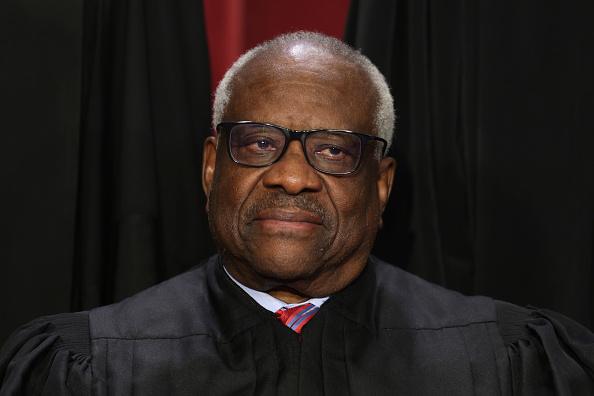Billionaire who treated Justice Thomas to vacations also bought property from him and his relatives

U.S. Supreme Court Justice Clarence Thomas poses for an official portrait in the Supreme Court building Oct. 7, 2022, in Washington, D.C. Photo by Alex Wong/Getty Images.
A company owned by billionaire Harlan Crow bought a home and two vacant lots from U.S. Supreme Court Justice Clarence Thomas and his relatives in 2014, according to a new report by ProPublica.
Thomas’ elderly mother was living in the Savannah, Georgia, home.
“Soon after the sale was completed, contractors began work on tens of thousands of dollars of improvements on the two-bedroom, one-bathroom home,” according to the ProPublica report. “The renovations included a carport, a repaired roof and a new fence and gates, according to city permit records and blueprints.”
Thomas did not disclose the transactions, according to the story. The property sellers were Thomas, his mother and the family of Thomas’ late brother. Thomas had spent part of his childhood in the home where his mother lived.
Crow paid $133,363 for the properties. It’s unclear whether he paid fair market value, according to ProPublica. The year before the purchase from the Thomases, Crow bought a vacant lot and a small home on the same block for $40,000.
Crow is the billionaire and GOP donor who treated Thomas and his wife, Virginia “Ginni” Thomas, to luxury vacations at his private resort and his Texas ranch, according to previous reporting by ProPublica. Thomas traveled on Crow’s superyacht and private yet.
ProPublica spoke with four experts who said Thomas’ failure to disclose the sale appears to violate a federal disclosure law that applies to justices and other officials. The law exempts from disclosure property used solely as a personal residence of the person required to make the disclosure. Experts said Thomas didn’t qualify for the exemption.
Crow told ProPublica in a statement that he bought the home because he hoped to create a public museum at the property in the future that would tell Thomas’ story.
“I approached the Thomas family about my desire to maintain this historic site so future generations could learn about the inspiring life of one of our greatest Americans,” Crow said in the statement. Improvements were made to the property “to preserve its long-term viability and accessibility to the public.”
The vacant lots “were later sold to a vetted builder who was committed to improving the quality of the neighborhood and preserving its historical integrity,” Crow said.
Crow said he paid market rate “based on many factors including the size, quality and livability of the dwellings.”
Crow did not respond to ProPublica’s questions about whether he charged rent to Thomas’ mother, who is now 94. Neighbors told the publication that she still lives in the home.
Hat tip to How Appealing.
See also:
ABA Journal: “A binding code of ethics for SCOTUS justices is needed to protect the court’s credibility, delegates say”



